Not all racing drivers are created equal. New world champion Nico Rosberg is the son of a former F1 champion, grew up in Monaco, speaks five languages and turned down an offer to study aeronautical engineering at Imperial College, London.

It's not often you hear the sound of film critics sobbing quietly to themselves, but this really happened at the screening I attended of A Monster Calls. Having seen the trailer, with its scenes of a giant tree stomping around a spooky-looking rural landscape, I'd marked it down as one to avoid. How wrong can you be.

One hardly expects a film like Why Him? to be high art, which is another way of saying that if you approach it in the right spirit (and with enough drink inside you) this well-timed holiday release should provide guiltily entertaining fun. Most easily described as a coarsened Meet the Parents redux, John Hamburg's generation-gap comedy pits the decent but fundamentally square Ned Fleming (Bryan Cranston) against the spectacularly badly behaved Silicon Valley squillionaire, Laird Mayhew (James Franco), who just might end up being Ned's son-in-law.
Can the two men co-exist? Things don't look good from the moment Ned and wife Barb (Megan Mullally) arrive at Laird's spare-no-expense California pile only to be met by an expletive-prone hipster whose culinary tastes tend towards soil and smoked bear. By way of contemporary art, there's a urine-encased moose on display that might give even Damien Hirst pause, while Laird's fondness for tattoos conjoined with his casual disrgard for clothes poses challenges for the couple's beloved daughter Stephanie (Zoey Deutch), a Stanford University dropout who just wants everyone to get along.
Laird, it seems, is Stephanie's first real boyfriend and certainly embraces his Christmas-time visitors head on. Scarcely has Barb laid eyes on her daughter's buff piece of uber-wealthy rough before Laird gives his putative mother-in-law a smackeroo on the lips.
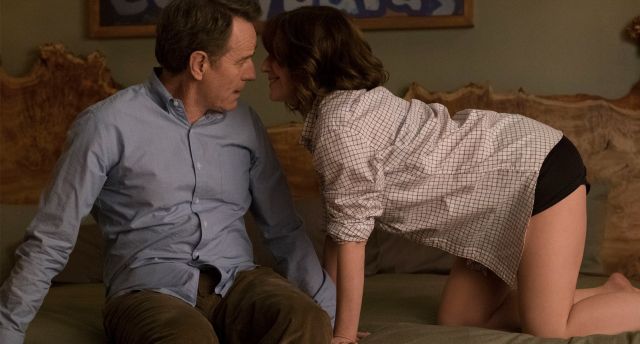 Stephanie's younger brother, Scotty (Griffin Gluck), gets an unexpected moniker as a "double dicker" - no, not a bus - while estate manager and apparent jack of all trades, Gustave (Keegan-Michael Key), looks on with po-faced, unshockable aplomb. Key's sausage-thick German accent provides a good running joke.
Stephanie's younger brother, Scotty (Griffin Gluck), gets an unexpected moniker as a "double dicker" - no, not a bus - while estate manager and apparent jack of all trades, Gustave (Keegan-Michael Key), looks on with po-faced, unshockable aplomb. Key's sausage-thick German accent provides a good running joke.
Ian Helfer's script - from a story by himself, Hamburg, and a not-unexpected third party in Jonah Hill - starts the mudslinging almost at once. Ned labels Laird an "abject lunatic" and worse, the father saving the odd snarl for his own over-enthusiastic son: "Stop talking," he snaps at Scotty, "and eat your paper!" In lesser or at least different hands - one wonders what might have resulted with someone like Russell Brand cast as Laird - the audience might simply tune out of the gathering provocations posed to family decorum.
For my part, I confess to letting the various indulgences escape censure and warming instead to the undeniable sweetness that Franco communicates throughout - a social reprobate who means well whether offering up a kiss or, indeed, the rock band KISS. Providing something to delight all generations (and genders), the film grants Mullally an extended scene in which Barb gets "superbaked" and a crotch-biting face-off, so to speak, between Ned and Laird that both actors commit to with real abandon. Not every December release is Oscar bait, one can practically hear all concerned with this venture thinking to themselves. In which case, what the hell? Or, indeed, why not Why Him?
Overleaf: watch the trailer for Why Him?

Tinseltown's relationship to its more sophisticated, older New York brother is analogous to Ethan Mordden's engagement by Oxford University Press. The presentation is a sober, if slim, academic tome with an austere assemblage of black-and-white photos in the middle; what we get in the text is undoubtedly erudite but also racy, gossipy, anecdotal, list-inclined, sometimes camp and a tad hit and miss.

Despite being kitted out with a full-scale intergalactic spaceship and all known computerised effects, Passengers is essentially a two-hander for its stars Chris Pratt and Jennifer Lawrence. Or you could maybe stretch that to a two-and-a-half-hander, if you include Michael Sheen's oily and obsequious bar-tending android.
Perhaps it's part of director Morten (The Imitation Game) Tyldum's point that even if you're surrounded by the most lavish futuristic technology, space is still an infinite and soulless wasteland of nothingness, into which all human life might easily vanish without trace. The set-up is that Jim Preston (Pratt) is one of 5,000 passengers aboard the good ship Avalon (which resembles an enormous gyroscope whirling through space, pictured below). The passengers and 250-odd crew members are all slumbering in hibernation pods as the Avalon takes them to a new colony planet called Homestead 2. Earth, we gather from the smiley, airbrushed promotional videos broadcast by the Homestead corporation, has become overcrowded, overpriced and overrated. Why not take the journey of a lifetime to a new future on a brand new planet?
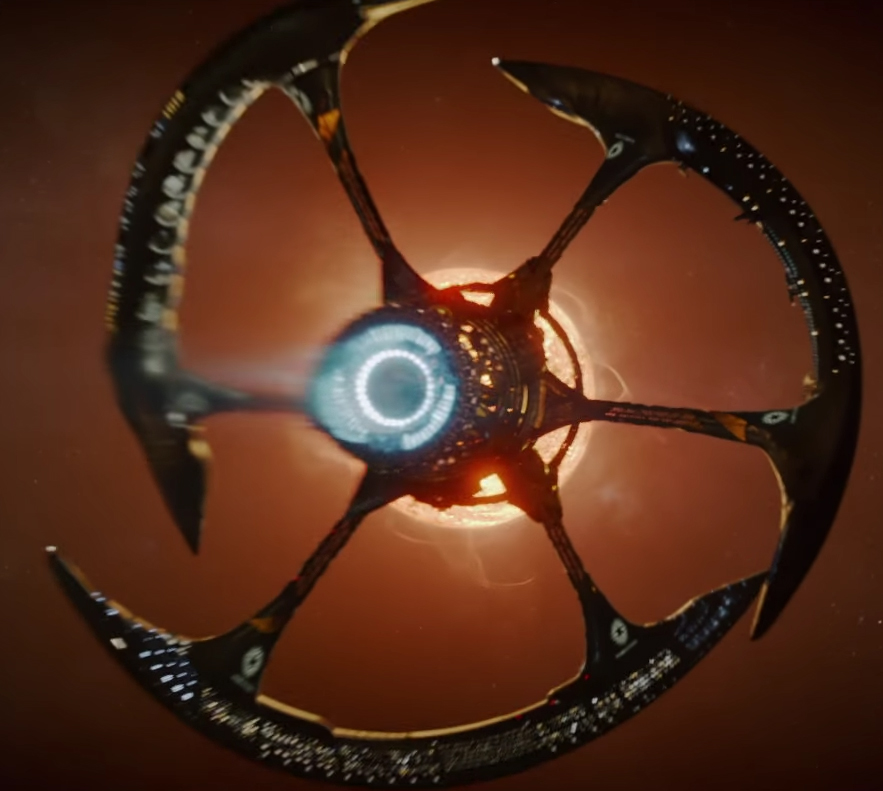 Preston, an engineer proud of his practical skills, has decided this could be just what he needed. However, when the Avalon is damaged by a meteorite, this causes Preston's sleeping pod to open and wake him up. Imagine his dismay when he finds that instead of making planet-fall at Homestead 2, he's still 90 years away from his destination. And there's no way of putting himself back to sleep again.
Preston, an engineer proud of his practical skills, has decided this could be just what he needed. However, when the Avalon is damaged by a meteorite, this causes Preston's sleeping pod to open and wake him up. Imagine his dismay when he finds that instead of making planet-fall at Homestead 2, he's still 90 years away from his destination. And there's no way of putting himself back to sleep again.
The first chunk of the film depicts his efforts to come to terms with his predicament, as he vainly tries to break into the high-security flight deck to wake the sleeping crew or call earth for help. Writer Jon Spaihts has some fun satirising the familiar predicament of the frustrated customer trying to get sense out of a computerised helpline – he manages to send a message to earth, but then a recorded voice informs him he'll have to wait 25 years for a reply, and by the way that call just cost $60,000. Further humiliation awaits in the fully automated dining-room, where Jim's budget-price ticket only entitles him to bog-standard coffee (not the blueberry java or the Guatemalan latte) and a breakfast which resembles a dollop of stale cement.
Though he diverts himself with space-walks and jitterbugging with holographic dancers in the recreation area, the prospect of spending solitary decades watching the universe slide past weighs crushingly upon him. Things obviously look up when Jim's solitude is banished by the arrival of Aurora Lane (Lawrence), a writer from New York who thinks travelling to Homestead 2 and back would provide great material for a book. Not only is she a higher-class traveller with access to a superior range of comestibles, but she's... well, she's Jennifer Lawrence, equipped with a refreshingly feisty attitude as well as an eye-catching range of svelte sports and swimwear (pictured below, Michael Sheen and Chris Pratt).
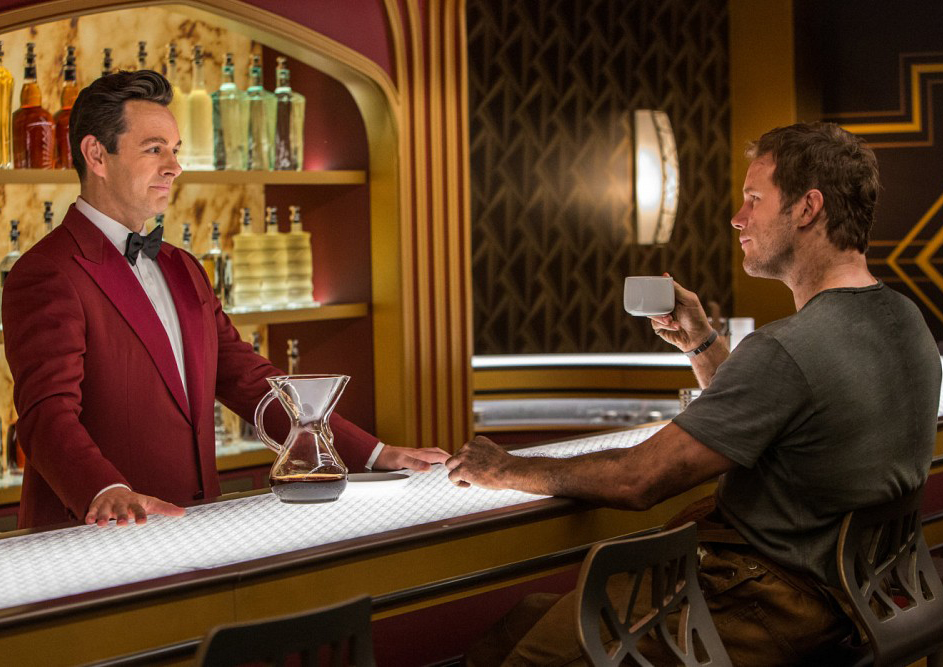 But there's a huge twist in the tale, which I daren't reveal (though you can find out about it on the net if you must). Suffice to say that to Jim's physical predicament is added a weighty moral conundrum, which colours the subsequent course of his interminable journey and bends the outcome in ways not all reviewers have been happy with. I would only add that it's never wise to confide too fully in an android (let's hope this isn't Michael Sheen's final role, as he back-pedals frantically from that unfortunate interview where he apparently said he was quitting acting to join the struggle against fascism). This isn't 2001: A Space Odyssey, or even The Martian, but it's an entertaining movie offering some chewy food for thought.
But there's a huge twist in the tale, which I daren't reveal (though you can find out about it on the net if you must). Suffice to say that to Jim's physical predicament is added a weighty moral conundrum, which colours the subsequent course of his interminable journey and bends the outcome in ways not all reviewers have been happy with. I would only add that it's never wise to confide too fully in an android (let's hope this isn't Michael Sheen's final role, as he back-pedals frantically from that unfortunate interview where he apparently said he was quitting acting to join the struggle against fascism). This isn't 2001: A Space Odyssey, or even The Martian, but it's an entertaining movie offering some chewy food for thought.

Whether you use its optional subtitle A Star Wars Story or not, Rogue One arrives with a diminutive air. Filling in some infamous but minor dopiness in the original Star Wars – why build the Death Star with such a fatal design flaw?

Thirteen-year-old Aishopan desperately wants to be an eagle hunter. The problem is, she’s a girl. And in the traditional Mongolian nomadic community where she lives, rearing a golden eagle chick to hunt foxes for their fur is very much the preserve of men.
British director Otto Bell’s sumptuous film is certainly an inspirational story of struggle and triumph, and it’s set against an arrestingly unfamiliar context – the icy peaks and frozen rivers at the crossroads between Mongolia, Kazakhstan, China and Russia. It’s a warm-hearted offering, almost to a fault – indeed, its set-pieces and lavish camerawork make it feel more feature than documentary – that charts the young Aishopan’s quiet determination to pursue her passion. And by her looks of unmitigated delight as she begins to train her eagle, a passion it clearly is. To demonstrate the villains of his story, Bell contrasts her enthusiasm with a remarkable sequence of fur-hatted elders shaking their heads at the audacity of this girl daring to step into their male-only world.
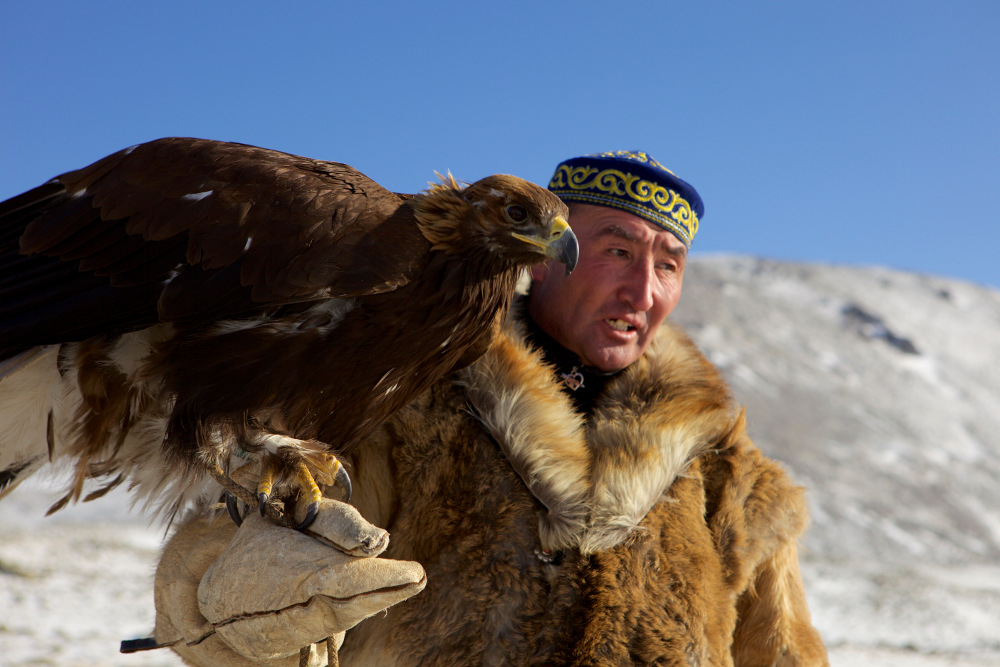 It’s all beautifully delivered, family-friendly (except perhaps for the slaughtering of a sheep early on), and with a stirring message of equality and determination. And although The Eagle Huntress may not exactly challenge our preconceptions of exotic, yurt-inhabiting, horse-riding Mongolian nomads, it at least fills in some unexpected modern details – motorbikes, solar panels, and Aishopan’s rustic boarding school and the gaggle of excitable teenagers who share its dormitory.
It’s all beautifully delivered, family-friendly (except perhaps for the slaughtering of a sheep early on), and with a stirring message of equality and determination. And although The Eagle Huntress may not exactly challenge our preconceptions of exotic, yurt-inhabiting, horse-riding Mongolian nomads, it at least fills in some unexpected modern details – motorbikes, solar panels, and Aishopan’s rustic boarding school and the gaggle of excitable teenagers who share its dormitory.
Bell examines Aishopan’s warm, close relationship with her father Nurgaiv (pictured above) in tender detail. He’s an eagle hunter himself, with generations of tradition behind him, and entirely supportive of his daughter’s seemingly natural talent without being pushy. Their closeness emerges most touchingly – and dramatically – in the film’s pivotal eaglet-stealing scene, where Aishopan dangles precariously off a mountainside from a rope wrapped equally precariously around her father’s body, in order to snare what becomes her hunting bird.
Most memorable of all, though, is veteran nature photographer Simon Niblett’s astonishing cinematography of the Mongolian mountains and steppes (pictured below), often breathtaking in its endless vistas – and achieved with some stunning aerial shots from drones and cranes.
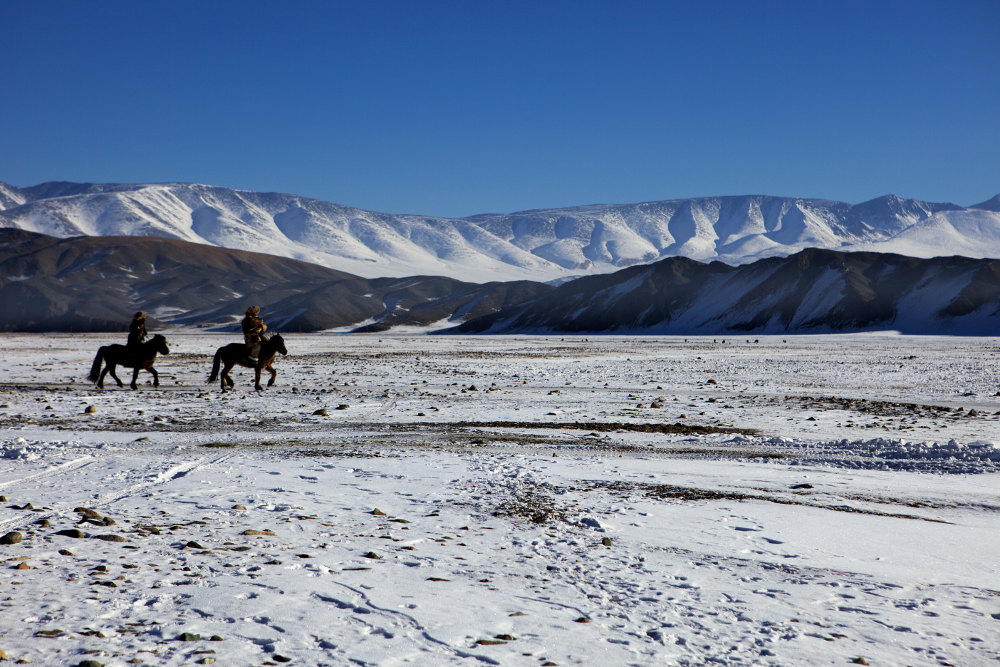 But for all its ravishing camerawork and its inspirational message, there are some deep ironies here. The biggest one is the seeming lack of serious opposition to Aishopan taking part in the film’s climactic hunting competition – aside from a few frowns and raised eyebrows from the other competitors, hunters and judges alike actually seem amused and then impressed by her abilities. Other than the elders’ gentle disapproval, Bell simply doesn’t delve deeply enough into the nomadic society’s gender issues to explore any beliefs behind resistance to Aishopan’s ambitions. In fact, it’s Aishopan’s mother – who seems to have quite a distant, almost subservient relationship to both her husband and daughter – who most clearly embodies women’s rather restricted status.
But for all its ravishing camerawork and its inspirational message, there are some deep ironies here. The biggest one is the seeming lack of serious opposition to Aishopan taking part in the film’s climactic hunting competition – aside from a few frowns and raised eyebrows from the other competitors, hunters and judges alike actually seem amused and then impressed by her abilities. Other than the elders’ gentle disapproval, Bell simply doesn’t delve deeply enough into the nomadic society’s gender issues to explore any beliefs behind resistance to Aishopan’s ambitions. In fact, it’s Aishopan’s mother – who seems to have quite a distant, almost subservient relationship to both her husband and daughter – who most clearly embodies women’s rather restricted status.
It was probably a bit of a mistake, too, to use the rather mannered, disconcertingly on-off commentary from British actor Daisy Ridley (of Star Wars: The Force Awakens fame – also credited as an executive producer), who contributes so sporadically that each time she cuts in, you’d forgotten that there was a narrator at all.
There’s the unavoidable feeling by the end that reality has failed to delivery on Bell’s girl-against-the-world storyline. And his film’s rather paradoxical views on tradition – crucial to his picturesque portrayal of the nomads’ broader lives, but something to be challenged and subverted in Aishopan’s eagle-hunting ambitions – make it all the more problematic.

John Donnelly’s play The Pass scored a slate of five-star reviews when it ran at the Royal Court early last year – theartsdesk called it “scorching” – and plaudits for Russell Tovey’s central performance were practically stellar (“a star performance from onetime History Boys student that this actor's career to this point has in no way suggested,” we raved). For those who missed that sell-out, small-stage, seven-week run, Ben A Williams’ film adaptation delivers all the impact of that experience, in an independent British production that manages the transfer from stage to screen more than gamely. And Tovey remains quite remarkable.
Williams keeps the play's strict three-act structure intact, never tempted to open the story out with fill-in cinematic context: its action is claustrophobically limited to the the original's three hotel rooms, now visited at five-year intervals. Retaining the limited size of these spaces becomes a new asset as, particularly in the first episode, Tovey practically bounces off the edges of the screen, so vibrant is his performance, while close-ups bring us right into what's going on inside his head.
Their allegiances of friendship will be tested
That opening brings home the nuance of Donnelly’s title, introducing the work’s twin themes, football and sexuality. Tovey’s Jason, peroxide-blonde in an engagingly naive way, and Arinze Kene’s Ade are both 19, professional footballers playing as substitutes but about to get their potential break in a Champion’s League match. They are sharing a hotel room (it’s Bucharest, but location isn’t important), relaxing, joshing one another around (main picture), almost jumping up and down on the beds like kids: they’re old, close pals, who have been leading the same intense sporting life of youth training for a decade. What lies beyond that world features little here: of their backgrounds we learn only that Jason’s father is a builder, more prosperous (so he’s a bit “different”, posh even, in these circumstances), while Nigerian Ade’s dad is a preacher, a factor that has Jason ribbing his friend, but affectionately – he’s a joker, albeit one who never finally reveals himself.
Their allegiances of friendship will be tested. Talking about tactics for the match the next day, the issue of one kind of pass comes up – whether either of the players will feed the other the ball at the right moment, or stick in there with a solo chance that just might bring fame. Then there’s the other pass: they’re both naked except for their Y-fronts, they're both buff, and the familiarity of physical banter easily shades into something else. We don’t see quite what, or how it ends, only a kind of nervous foreplay that sits uneasily somewhere between japery, provocation, and something more serious.
 Just how serious becomes apparent as Jason’s fate unfolds. This premier football world is one in which being gay and becoming a star are anathema: we remember all too well the only first-class player who revealed his homosexuality, or very possibly, was forced to do so by the threat of tabloid exposure – Justin Fashanu, whose subsequent career, life and death surely remain a doleful object lesson to anyone potentially in the same position. The next time we see Jason, he’s made the big time, holding court now in a flashy penthouse suite to Lindsay (Lisa McGrillis, pictured with Tovey, above), a club dancer whom he’s picked up (though we learn he’s married by now, with children). He’s still as jocularly, wordily in control as ever, however much it looks suspiciously like a tabloid sting. But the permutations of deceit here are multi-layered: at least Jason is controlling them, as something he said in the opening scene gains a new, chilling significance.
Just how serious becomes apparent as Jason’s fate unfolds. This premier football world is one in which being gay and becoming a star are anathema: we remember all too well the only first-class player who revealed his homosexuality, or very possibly, was forced to do so by the threat of tabloid exposure – Justin Fashanu, whose subsequent career, life and death surely remain a doleful object lesson to anyone potentially in the same position. The next time we see Jason, he’s made the big time, holding court now in a flashy penthouse suite to Lindsay (Lisa McGrillis, pictured with Tovey, above), a club dancer whom he’s picked up (though we learn he’s married by now, with children). He’s still as jocularly, wordily in control as ever, however much it looks suspiciously like a tabloid sting. But the permutations of deceit here are multi-layered: at least Jason is controlling them, as something he said in the opening scene gains a new, chilling significance.
At least Jason is still on a roll, master of his own universe. By the final time we encounter him, that’s going, the third luxury hotel room now more like an enclosure: there’s an exercise bike, but his routine is driven by booze and painkillers (it's only a matter of time before a knee goes: then it will all be over). He's divorced, and has imperiously summoned Ade. They haven't met since the opening scene: Ade never got his break, but he has come out – and he’s got a boyfriend – and is working as a plumber, a life very different from all the glory and rewards that have come to his erstwhile mate. It’s a very bruising encounter, not only for what their reunion brings, but for how Jason ropes in the hotel bellboy, who's in awe to this sporting hero, to involve him in a perverse, vindictive ritual of humiliation (Nico Mirallegro, pictured below, left, plays that supporting role, youthfully naïve, more The Village than Rillington Place). Jason’s game, still so manipulative and deceitful, would be brilliant – if it wasn’t tragic now. What is a man, if he gain the whole world, and lose himself? Tovey captures all that, and more.
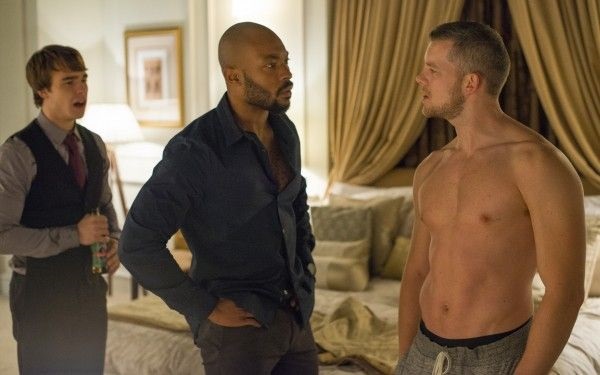 Arinze Kene as Ade is the only one not from the original Royal Court production, but he more than keeps up with play. He’s got cheek bones that give his face a particular quality, and there’s a moment at the peak of that first scene when he catches something remarkable indeed – a single glance of pure, gut-wrenching sadness that comes almost out of nowhere, but somehow colours the film. The Pass is Ben Williams’ feature debut, and he gets the most out of such visual chances, allowing us to dwell on moments in a way that theatre can’t (and a certain theatrical staginess sometimes remains). It’s there in some of Tovey’s expressions, Chris O’Driscoll’s camera lingering on something for a moment in a way that makes it resonate.
Arinze Kene as Ade is the only one not from the original Royal Court production, but he more than keeps up with play. He’s got cheek bones that give his face a particular quality, and there’s a moment at the peak of that first scene when he catches something remarkable indeed – a single glance of pure, gut-wrenching sadness that comes almost out of nowhere, but somehow colours the film. The Pass is Ben Williams’ feature debut, and he gets the most out of such visual chances, allowing us to dwell on moments in a way that theatre can’t (and a certain theatrical staginess sometimes remains). It’s there in some of Tovey’s expressions, Chris O’Driscoll’s camera lingering on something for a moment in a way that makes it resonate.
Full and final kudos must go to producer Duncan Kenworthy too, for pushing The Pass so adroitly down its independent British route rather than into the studio system (you never know how easily that can wreck a project until it’s already happened). Tovey’s five-star performance brings the film a deserved fourth one of its own, and it can only be hoped that one of its lasting achievements may be to influence broader public attitudes, even in just the smallest way, to its subject for the better.
Overleaf: watch the trailer for The Pass

DW Griffiths's 1915 silent epic, The Birth of a Nation, became notorious for its pejorative portrayal of black people and its heroic vision of the Ku Klux Klan. For his directorial debut, Nate Parker has appropriated Griffiths's title and whipped it into a molten onslaught against America's history of slavery and racial prejudice.
Arriving in an America outraged – yet again – by police violence and witnessing the rise of Black Lives Matter, Parker's The Birth of a Nation was uncannily timely, and it prompted a studio bidding war when it premiered at Sundance in January this year. It's a dramatisation of the real-life slave rebellion led by Nat Turner in Southampton County, Virginia in 1831, depicting Turner as a visionary preacher pre-ordained to lead his people from their bondage, though his bloody attempt to do so was doomed to failure.
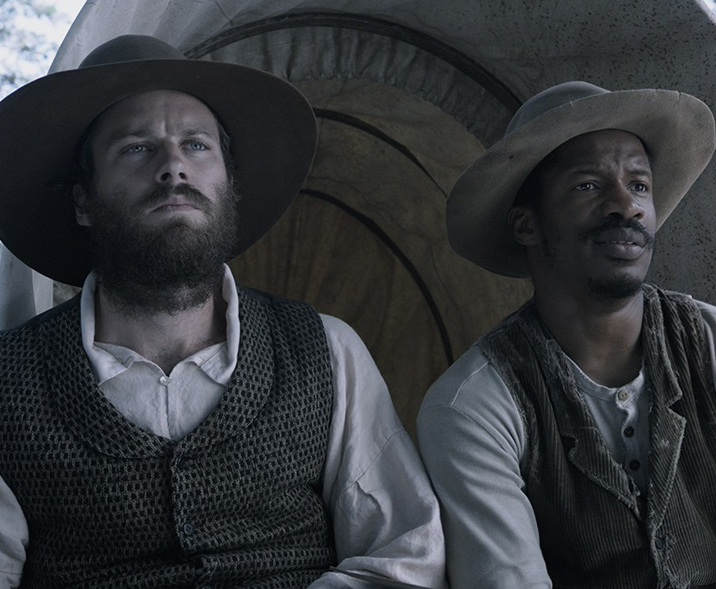 Parker directed, stars and wrote the screenplay (the story is credited to Parker and Jean McGianni Celestin), and he has brought a charismatic energy to the project which often overrides the orthodox nature of the storytelling. As a boy, the young Turner is taught to read by plantation mistress Elizabeth Turner (Penelope Ann Miller), a kindly act somewhat undercut by Elizabeth's view of her slaves as a species positioned somewhere between infanthood and the animal kingdom. "These books are for white folks," she explains patiently. "They're full of things your kind wouldn't understand."
Parker directed, stars and wrote the screenplay (the story is credited to Parker and Jean McGianni Celestin), and he has brought a charismatic energy to the project which often overrides the orthodox nature of the storytelling. As a boy, the young Turner is taught to read by plantation mistress Elizabeth Turner (Penelope Ann Miller), a kindly act somewhat undercut by Elizabeth's view of her slaves as a species positioned somewhere between infanthood and the animal kingdom. "These books are for white folks," she explains patiently. "They're full of things your kind wouldn't understand."
Nonetheless, the lad studies the Bible, finds he has a gift for sermonising, and begins preaching the Word to his fellow slaves. Times are hard in the South, and at the urging of the Reverend Zalthall (Mark Boone Junior), Nat's owner Sam Turner (Armie Hammer, pictured above with Parker) hires Nat out to local plantations, with the aim of placating rebellious urges among the slaves with soothing Scriptural messages.
Sam Turner seems relatively liberal, enjoying a friendly rapport with Nate (they were childhood friends) and rescuing him from the vengeful intentions of a spiteful fellow landowner. However, in Hammer's skilful portrayal, he's gradually revealed as a weak man with a drink problem who's never going to break ranks with his white compatriots and become a civil rights advocate for his negro chattels.
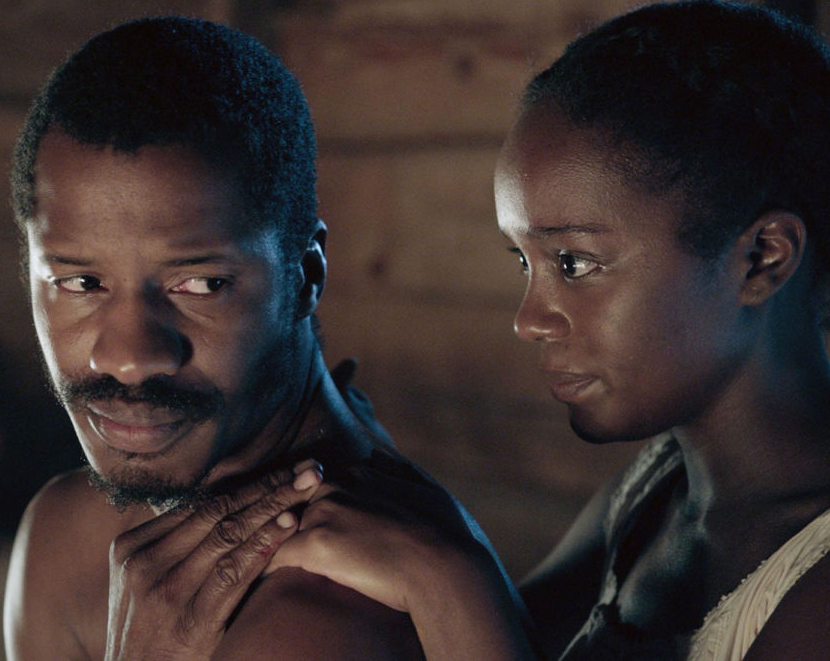 The narrative steadily gathers pace as it arcs towards its inevitable denouement. Nat's early optimism is soured by the appalling sights he sees on his travels (not least a scene where a slave has his teeth knocked out with a chisel before being force-fed). His preaching begins to sound more like a cleverly coded exhortation to fling off the chains of bondage and rise up, and his progress towards rebellion is guided by visionary images (corn spattered with blood, a dramatic total eclipse). A couple of incidents of rape, including an assault by slave-catchers on his wife Cherry (Aja Naomi King, pictured above, depicted as little more than a signifier of idealised love and fidelity), prompt Nat to recall that the Lord could be vengeful as well as merciful. When he's brutally flogged by Sam, for baptising a white man, the rebellious die is cast.
The narrative steadily gathers pace as it arcs towards its inevitable denouement. Nat's early optimism is soured by the appalling sights he sees on his travels (not least a scene where a slave has his teeth knocked out with a chisel before being force-fed). His preaching begins to sound more like a cleverly coded exhortation to fling off the chains of bondage and rise up, and his progress towards rebellion is guided by visionary images (corn spattered with blood, a dramatic total eclipse). A couple of incidents of rape, including an assault by slave-catchers on his wife Cherry (Aja Naomi King, pictured above, depicted as little more than a signifier of idealised love and fidelity), prompt Nat to recall that the Lord could be vengeful as well as merciful. When he's brutally flogged by Sam, for baptising a white man, the rebellious die is cast.
Parker has been accused of excessive self-regard for the Christ-like overtones in his portrayal of Turner, while any positive contribution towards bridging the racial divide has been scuppered by his depiction of the white characters almost exclusively as depraved, misshapen sadists. The Birth of a Nation's apparently glittering commercial prospects in the States were dented by a media storm over the fact that both Parker and Celestin had faced rape allegations in 1999. Nevetheless, if we can judge the art and not the artist, this is vivid and unsettling film-making.
Overleaf: watch the trailer for The Birth of a Nation

As an old Sixties lefty brought up on paranoia-infused thrillers like The Parallax View or All the President's Men, Oliver Stone loves ripping open great American conspiracies. However, in contrast to his earlier labyrinthine epics Nixon and JFK, this account of CIA whistleblower Edward Snowden keeps clutter to a minimum as Stone fashions a tense, fast-moving drama which will leave you pondering over what's really justifiable for the greater good.
It's no great surprise to find that Stone portrays Snowden as a noble crusader for free speech and democratic accountability against the might of America's intelligence agencies, and if you happen to work for the CIA you'll hate this movie, but Stone makes Snowden's journey towards his fateful decision to spill the top-secret beans plausible and persuasive. Joseph Gordon-Levitt's Snowden (many of whose family were federal lawyers or in the US military) starts out as a sincere young patriot, training for Special Forces but rejected as not physically strong enough to make the cut (pictured below). A computer genius who's keen to serve his country, he joins the CIA instead and whizzes through the admission tests with astounding ease.
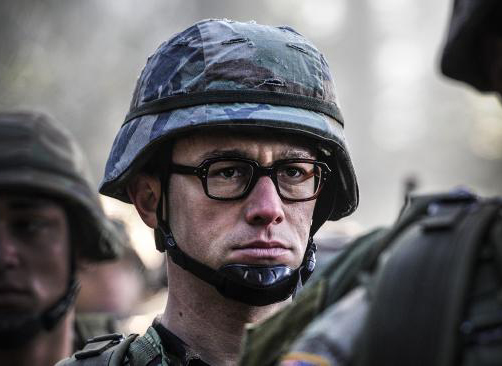 However, as he's given various postings around the world, he becomes disillusioned at how the CIA and National Security Agency are abusing their seemingly unlimited powers. He's shocked at the way Timothy Olyphant's Geneva-based CIA operative cynically compromises a contact and blackmails him into becoming an informant, then later is horrified by the way a programme he helped create, EpicShelter, is being used for marking targets for extermination in drone attacks.
However, as he's given various postings around the world, he becomes disillusioned at how the CIA and National Security Agency are abusing their seemingly unlimited powers. He's shocked at the way Timothy Olyphant's Geneva-based CIA operative cynically compromises a contact and blackmails him into becoming an informant, then later is horrified by the way a programme he helped create, EpicShelter, is being used for marking targets for extermination in drone attacks.
The sheer extent of what the Americans were, or are, up to remains flabbergasting, with the NSA supposedly capable of tracking every mobile phone on the planet, though it's supposedly all justifiable in the name of national self-defence. They're trying to "find the terrorist in the internet haystack", as Snowden's CIA trainer Hank Forrester (Nicolas Cage) puts it.
"You didn't tell me we were running a dragnet on the whole world," Snowden protests to his boss Corbin O'Brian (Rhys Ifans), who likes to point out that "the front line is everywhere". For the the O'Brian role, Ifans (pictured below) has assumed a gravelly baritone loaded with menace, and seems to be channelling Jason Robards and Scott Glenn as he looms ominously from the screen in giant close-ups.
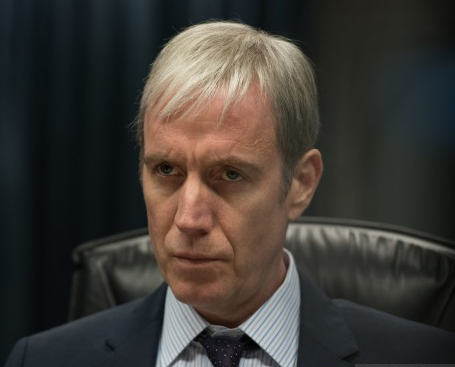 Stone isn't known for his light romantic touch, but he handles Snowden's complicated relationship with girlfriend Lindsay Mills (Shailene Woodley) deftly, and the way that Agency suspicions about Snowden's attitude to his work start to cast paranoid shadows over the couple's private life effectively personalises the broader picture. Indeed, the degree of intrusion which intelligence operatives are subjected to by their employers is a fascinating aspect of the tale.
Stone isn't known for his light romantic touch, but he handles Snowden's complicated relationship with girlfriend Lindsay Mills (Shailene Woodley) deftly, and the way that Agency suspicions about Snowden's attitude to his work start to cast paranoid shadows over the couple's private life effectively personalises the broader picture. Indeed, the degree of intrusion which intelligence operatives are subjected to by their employers is a fascinating aspect of the tale.
Scenes of Snowden hiding out in Hong Kong while Guardian journalists prepare to publish his reams of top-secret revelations tend towards melodrama (Tom Wilkinson seems to share only the most only tenuous of connections with defence correspondent Ewan MacAskill, while Joely Richardson makes an unfeasibly actressy hash of Janine Gibson, editor of Guardian USA). Melissa Leo's portrayal of Laura Poitras (who made the Snowden documentary Citizenfour to which Stone's movie is quite heavily indebted) is marred by the malevolent creepiness Leo brings to every role.
However, Gordon-Levitt is pitch perfect in the title role, gradually revealing the steely inner core behind his nerd-like exterior, and skilfully evoking Snowden's process of disillusionment as he sees more and more of the skull beneath the skin of his homeland. Overall, this is a much better film than Stone's recent history might have led you to anticipate.

